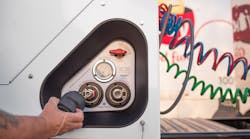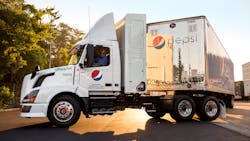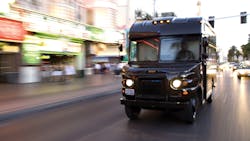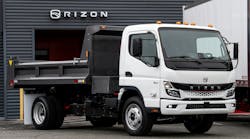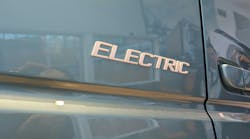Prices of diesel have been climbing again in recent months, and it's opening fleets' eyes once more to the alternatives. Maybe it's time to look beyond the rise and fall of that single, most dominant fossil fuel in trucking for a more stable outlook, potential savings, and other benefits to your operation.
But fleets considering trucks that run on natural gas, biodiesel, electric power and other alternative fuels often pilot test a handful of vehicles for their particular situation and needs, investing not only big dollars in trial-and-error but months of time to see how things work out—or don't.
A group of fleets and a nonprofit are looking to take some of that time and guesswork out of the equation. BSR, a global organization focused on sustainable business strategies, is partnering with a number of fleets to publish their experiences with various alternative fuels in its Future of Fuels Case Study Library. The idea is to help others in trucking make more informed decisions when considering switching from diesel.
"Understanding both the environmental performance and the operational benefits and challenges of new technologies is vital for fleet owners," contended Mike O' Connell, vice president of supply chain for fleet and sustainability at PepsiCo, one of the companies sharing its involvement with alt fuels through BSR's clearinghouse. "Concrete case studies further that understanding and ensure that we are not replicating work already conducted."
Along with that company, others that have thrown their hats in the ring with BSR include AB InBev, Amazon, the Coca-Cola Co., Golden State Foods, McDonald's, UPS, and Wal-Mart Stores. Early this month, BSR announced it would begin publishing case studies in a standardized format from these fleets' fuel technology pilots to allow their peer companies to learn from equipment trials and determine what might work best for them.
BSR noted that one of its goals is to get fleets to take up more sustainable, "clean" fuel options. But that doesn't mean it's a bygone conclusion that any alternative fuel will work out better for a fleet than diesel—the studies discuss the negatives as well as the positives as well as some strategy changes they made after they tried out a particular type of truck.
Still, the group's five initial case studies published led to alternative fuels being implemented into the respective fleets on a broader or more permanent basis. "The case studies suggest that there are fewer and fewer operational barriers to implementing new fuel technologies," BSR stated.
In the initial launch, the group published case studies from IKEA, PepsiCo, and UPS. The fleets included information from their trials—multiple ones in IKEA's case—of renewable diesel, compressed natural gas, electric vehicles and more. Notably, some of the alternative fuel trials are much more extensive than others.
Go electric?
For instance, IKEA discussed a brief experience with electric trucks, a topic that's garnered a good deal of attention lately. The company provided results from one battery electric container truck run on a single day: Dec. 13, 2017. It was in Dongguan, China on a route of 60 km, or a little over 37 miles. The truck carried an average load of 15 tons, a maximum of 16.6 tons and was operated over a test period of 9 hours. IKEA set up a charging station in the warehouse the truck loaded from, and it took 60 minutes to charge it.
But even with that limited use, IKEA reported savings in fuel costs of 30% and maintenance savings of 10%, although the company noted it included government subsidies in those assessments. IKEA reported that its drivers had about "average" satisfaction with the electric truck and required special training in operating and charging the vehicle as well as emergency procedures.
The company pointed to long-term savings and sustainability from the truck type, affirming what many electric vehicle manufacturers contend is a significantly lower total cost of ownership that electric vehicles offer. After only that short experience, IKEA said it would include electric trucks in its fleet and would recommend the technology to others—and potentially for different applications.
Most familiar alternative: CNG
More familiar is a case study from PepsiCo exploring a trial of Class 8 tractors running on compressed natural gas, or CNG. Typically, the company explained that its diesel tractors carry an average of 27 tons and get about 6 mpg in its over-the-road operations, each logging an average of 105,000 miles per year. The trucks' length of haul is about 500 miles and they're kept in service for seven years; they usually carry heavier payloads on outbound routes, PepsiCo noted, with lighter loads on the return.
In 2011, the company decided to test two Class 8 trucks with 12L and 9L CNG engines to see how they would perform in different duty cycles and learn about their maintenance requirements and costs. PepsiCo also wanted to test whether drivers would take to the CNG trucks. Some barriers the company noted in running the trucks—which were loaded at up to 80,000 lbs. combined weight—included a lack of CNG infrastructure and fuel availability, special maintenance facilities and technician expertise required, and driver education.
For the most part, fueling of the CNG trucks wasn't all that different than refueling with diesel: it took about 15 minutes to fill up with 175 DGE (diesel gallon equivalent) with a 3,600 psi pump. PepsiCo rated CNG availability in its area of operation as "medium," noting that stations don't all have the same pumping capability. Consistency of pricing can be another challenge with CNG, the company pointed out.
PepsiCo went on to list additional difficulties, including unknown residual value of the CNG trucks, potentially troublesome fuel availability in emergency situations, and getting enough range with the vehicles. That didn't stop the company from upping its total CNG tractors to 16, although it reported it chose to nix the 9L engines due to underperformance and solely use the 12L with a fuel storage system of 160 DGE.
Overall, CNG cost the fleet less than diesel over time, and the CNG tractors racked up about the same maintenance costs as their diesel counterparts. But the CNG trucks cost more initially; PepsiCo advised other fleets to check into incentives that may be available to help reduce acquisition costs. The CNG trucks are quieter than those with diesel engines, PepsiCo noted, suggesting that fleets pay attention to the transmission they spec with them and design fuel tanks based on maintenance costs, labor costs, plumbing complexity, and safety.
Cost vs. environmental advantages
Somewhere in between IKEA's electric truck experience and PepsiCo's use of CNG tractors is a case study from UPS relating two weeks' use of a dozen trucks running renewable diesel, with half of those being Class 6 package cars and the other half Class 8 day cab tractors. That's a less-involved alternative fuel switch—UPS referred to it as a "drop in" replacement fuel, with no special equipment or vehicle modifications required.
But the renewable diesel showed significant differences compared with conventional diesel. The company reported that the trucks running on renewable diesel produced 4.2% less CO2 and up to 4.1% less NOx emissions, but got 3.5% to 4.8% less fuel economy. UPS recommended renewable diesel to other fleets as a way of reducing greenhouse gas emissions.
Reinventing the wheel, so to speak—particularly for businesses that rely on vehicles—can be slow and costly, and this is one way to help avoid that. This resource from BSR and its partnering companies already includes a range of fleet, vehicle, and alternative fuel types and contains pointers for others to consider before making a switch, and more is on the way.
"The library will grow as more case studies are submitted," BSR noted. "Buyers, regulators, and the public want freight that is simultaneously more economical, more flexible, and more sustainable."
